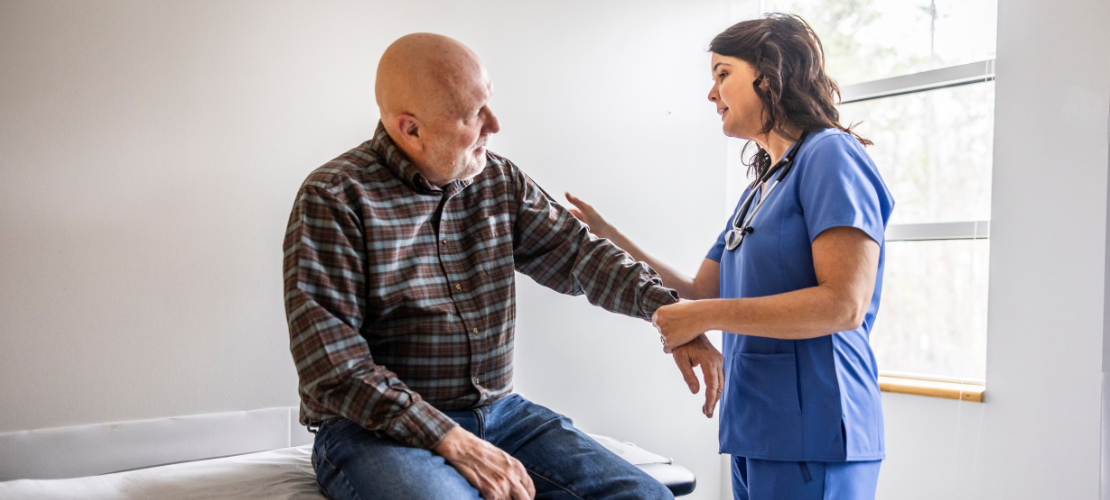Over one-third of adults in the UK are affected by long-term chronic pain. For some who have to live with this condition, the usual treatments like pain medication may only have limited benefits.
Professor Lesley Colvin is a pain researcher at the University of Dundee and a Consultant in Anaesthesia and Pain Medicine for NHS Tayside. Lesley talks to us about why chronic pain can be such a burden to live with and how health research is finding new ways to prevent and manage it.
What is chronic pain and why is it such a burden? .png?language_id=1)
Chronic pain is pain that lasts for three months or more and can develop as a result of injury, surgery or nerve damage. Musculoskeletal conditions like low back pain or osteoarthritis are the most common causes of chronic pain.
All forms of chronic pain have one thing in common - a very strong impact on people’s lives. This goes beyond the intensity of pain itself, affecting quality of life and someone’s ability to engage in work or social activities.
What do your patients say about their experiences of chronic pain?
We often ask patients to describe their pain level on a scale of 1 to 10. We find that for many, this form of pain scale simply doesn’t capture the full experience of chronic pain. For people who live with chronic pain for months or decades, it can disrupt and transform their lives in profound ways.
For example, people on chemotherapy can experience nerve or ‘neuropathic’ pain in their hands or feet during or after their cancer treatment. This chronic pain can become debilitating for cancer survivors. We sometimes hear that the burden of their ongoing pain is far worse than the experience of cancer itself. This highlights why chronic pain is such a major health challenge to address.
How is research helping to improve pain management?
Pain research is making big strides in improving how chronic pain is managed. Clinical studies show how the body responds to pain and provides more effective therapies. We’re also gaining a better understanding of the groups of people who might be at higher risk of experiencing chronic pain.
For example, research shows that childhood trauma such as abuse, neglect or violence can shape the body’s biological response to pain. The Consortium Against Pain inEquality (CAPE) project is looking to understand more about it. This includes a study called ACE-MAP, where my team are looking at how these experiences can increase the risk of chronic pain in later life. We’d like to find out whether people with these experiences as children need different types of pain-relieving treatment.
What are the big, unanswered questions for research?
Personalising treatment plans for chronic pain could make a big difference. But we still need to find the right mix of drugs or non-drug therapies (like physical or psychological therapies) that best work for each patient.
We still don’t know much about why people get chronic pain, and we need better ways to measure its full impact. Through the PAINSTORM project, for example, we’re looking to understand why someone might develop nerve pain during or after chemotherapy. This will help us to develop ways to reduce the risk of developing this type of chronic pain and hopefully prevent or treat it.

Join a chronic pain clinical trial:
Chronic pain studies currently recruiting participants through Be Part of Research include:
- What are the treatments and outcomes of people with obesity and severe knee osteoarthritis?
- Investigation of chronic pain patients’ experiences
- ACE-MAP - The impact of adverse childhood experiences on sensation and pain in people living with multiple long-term health conditions and chronic pain
- PAINSTORM - Study investigating the impact, risk and mechanisms of neuropathic pain (nerve pain) associated with chemotherapy. Partnership for Assessment and Investigation of Neuropathic Pain
You can also take part in vital health research on different forms of chronic pain, including back pain, osteoarthritis, and neck pain. Use our study search tool to find a study that interests you.
How you can get involved with research
Sign up to Be Part of Research to be contacted about a range of health and care research. Or check out our full list of studies to see if one is right for you.
And if taking part in a study doesn’t feel right at the moment there are other ways to get involved in research.








